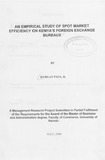| dc.contributor.author | Kurgat, Paul,K | |
| dc.date.accessioned | 2013-06-26T06:20:45Z | |
| dc.date.available | 2013-06-26T06:20:45Z | |
| dc.date.issued | 1998 | |
| dc.identifier.citation | Masters of business administration | en |
| dc.identifier.uri | http://erepository.uonbi.ac.ke:8080/xmlui/handle/123456789/40062 | |
| dc.description.abstract | They are all plain to those who understand, and
right to them that find knowledge ... - Proverbs 8:9.
In 1995, Kenya repealed the Exchange Control Act, an important feature in the
liberalisation of trade and foreign exchange regimes. This called for a legalisation of the
hitherto "black market" into the Foreign Exchange Bureaux.
This paper looks at the efficiency of the Foreign Exchange Bureaux markets in Kenya.
The intention here is to ascertain whether information is widely and cheaply available to
the market participants. Secondary data was obtained from Central Bank of Kenya and
analysed using chi-square distribution, F-distribution and line graphs. The results
obtained are discussed in this report.
The paper mainly found that the Foreign Exchange Bureaux market is generally
inefficient as evidenced by the number of arbitrage opportunities that exist. However,
possible benefits to Kenya from the introduction of the Forex Bureaux include an
increased availability of foreign currency and reduced inconveniences which small-scale
foreign currency buyers formerly experienced in the previous exchange control regime.
The most important development is the increased level of economic activity in the
country due to easy aecess to foreign currency. | en |
| dc.language.iso | en | en |
| dc.title | An empirical study of spot market efficiency on Kenya’s foreign exchange bureaux | en |
| dc.type | Thesis | en |
| local.publisher | Faculty of Commerce, University of Nairobi. | en |

